2021 NACo Policy Priorities
Upcoming Events
Related News
- Download PDF
Counties play an instrumental role in the overall public administration and governance of federal, state and local policies, programs and services.
America’s 3,069 county governments provide essential building blocks for healthy, safe and vibrant communities. Counties invest nearly $600 billion each year in taxpayer resources, through the leadership of nearly 40,000 county elected officials and 3.6 million county employees. Counties support and maintain key public and community infrastructure, help nurture and sustain a skilled workforce to support dynamic local economies, and promote public health and safety to protect our citizens.
NACo supports federal policies and programs that equip county governments with the resources and flexibility needed to effectively serve our residents. NACo works to preserve local decision making and protect counties from unfunded mandates and preemption of local authority. Since counties implement many federal programs at the local level and must enforce many federal regulations, NACo encourages meaningful intergovernmental consultation with counties throughout all federal policy, program and regulatory development processes.
NACo policy positions are introduced, debated and voted on by 10 policy steering committees with over 1,400 county officials, as well as NACo Board of Directors and full membership.
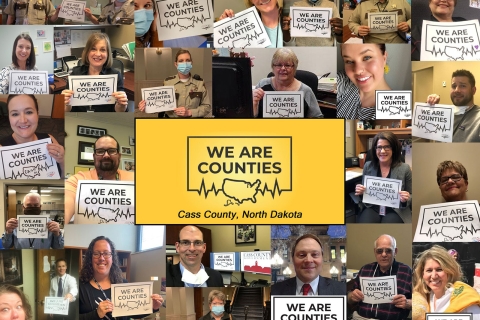
|
NACo's We are Counties campaign launched to put faces on the many frontline services counties are providing during the coronavirus pandemic, including Cass County, N.D.
Advocate for Additional Federal COVID-19 Relief in the Form of Direct, Flexible Aid to Counties of All Sizes
NACo supports federal efforts to provide direct, flexible COVID-19 relief to counties of all sizes as they continue to address and mitigate the impacts of the coronavirus pandemic. This financial and public health crisis continues to have massive budgetary effects on county governments – as much as $202 billion through Fiscal Year 2021. This tremendous loss of revenue and increase in response costs are resulting in job losses, essential service reductions, and forced cuts and delays in job-creating capital investment projects. NACo is committed to deploying federal aid in a fiscally responsible manner, ensuring resources are invested wisely at the local level with the express purpose of addressing the COVID-19 pandemic.
Nationwide, counties serve more than 300 million residents by supporting and operating nearly 1,000 hospitals, over 800 long-term care facilities, 750 behavioral health centers, 1,900 public health departments, emergency operations centers and 911 systems
Despite the detrimental fiscal impacts that counties of all sizes face due to the COVID-19 pandemic, only 5 percent of the nation’s counties were eligible to receive direct CRF funding through the CARES Act
 |
President-elect Joe Biden addresses the NACo Board of Directors Dec. 4. Photo by Emma Kinery/Bloomberg; used with permission.
Restore the Balance of Federalism and Optimize Intergovernmental Partnerships
NACo supports efforts that recognize and respect the unique roles and responsibilities of counties as essential partners—not just stakeholders—in our nation’s intergovernmental system of federal, state, local and tribal government officials. Consistent and meaningful engagement and consultation between intergovernmental partners is vital in the development and implementation of effective policies, programs and regulations. County governments are tasked with implementing state and federal policies and regulations at the local level and should be included at all stages of the governing process. NACo urges Congress to pass the Restore the Partnership Act and the Unfunded Mandates Information and Transparency Act to increase transparency to reduce regulatory burden, foster intergovernmental dialogue and unite all levels of government in supporting our unparalleled system of federalism.
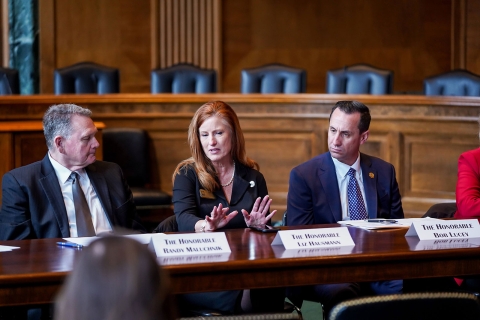
|
NACo's Transportation Policy Steering Committee Chair Liz Hausmann from Fulton County, Georgia highlights the importance of increased investments in, and reforms to, critical transportation programs during a Capitol Hill briefing.
Promote County Infrastructure Priorities
NACo supports efforts by the administration and Congress to increase our nation’s infrastructure investments to help promote economic development, public safety and overall mobility through a comprehensive infrastructure package, surface transportation reauthorization and water resources bill. Any federal infrastructure package should reflect county priorities, such as: allocate more federal seed capital and matching funds for locally owned infrastructure, increase local decision-making authority and flexibility, protect and restore tax-exempt municipal financing tools and streamline and shorten the federal permitting process while still requiring robust public participation and world-class environmental stewardship.
NACo supports a two-year authorization of the Water Resources and Development Act (WRDA) that will address county interests related to ports, inland waterways, levees, dams, wetlands, watersheds and coastal restoration. As owners, users and regulators of water resources and infrastructure, counties are directly impacted by the policies and funding authorized through WRDA authorizations. Any water infrastructure legislation should address the needs of counties, including: allocating federal matching funds for local governments to plan for and implement projects that reduce flood damage risks and address habitat restoration, connectivity and resiliency, ensuring counties are consulted prior to the federal government undertaking water resource projects within county boundaries, and strengthening the federal-state-local partnership in the decision-making process for water projects.
NACo policy positions are introduced, debated and voted on by 10 policy steering committees with over 1,400 county officials, as well as NACo Board of Directors and full membership.
Counties own and operate 45 percent of all public roads and almost 40 percent of the National Bridge Inventory and are directly involved in 78 percent of all public transportation systems and 34 percent of public airports
Counties also invest $134 billion annually in maintaining and operating public works, including transportation, water systems, ports, dams, hospitals, schools, libraries and courthouses.
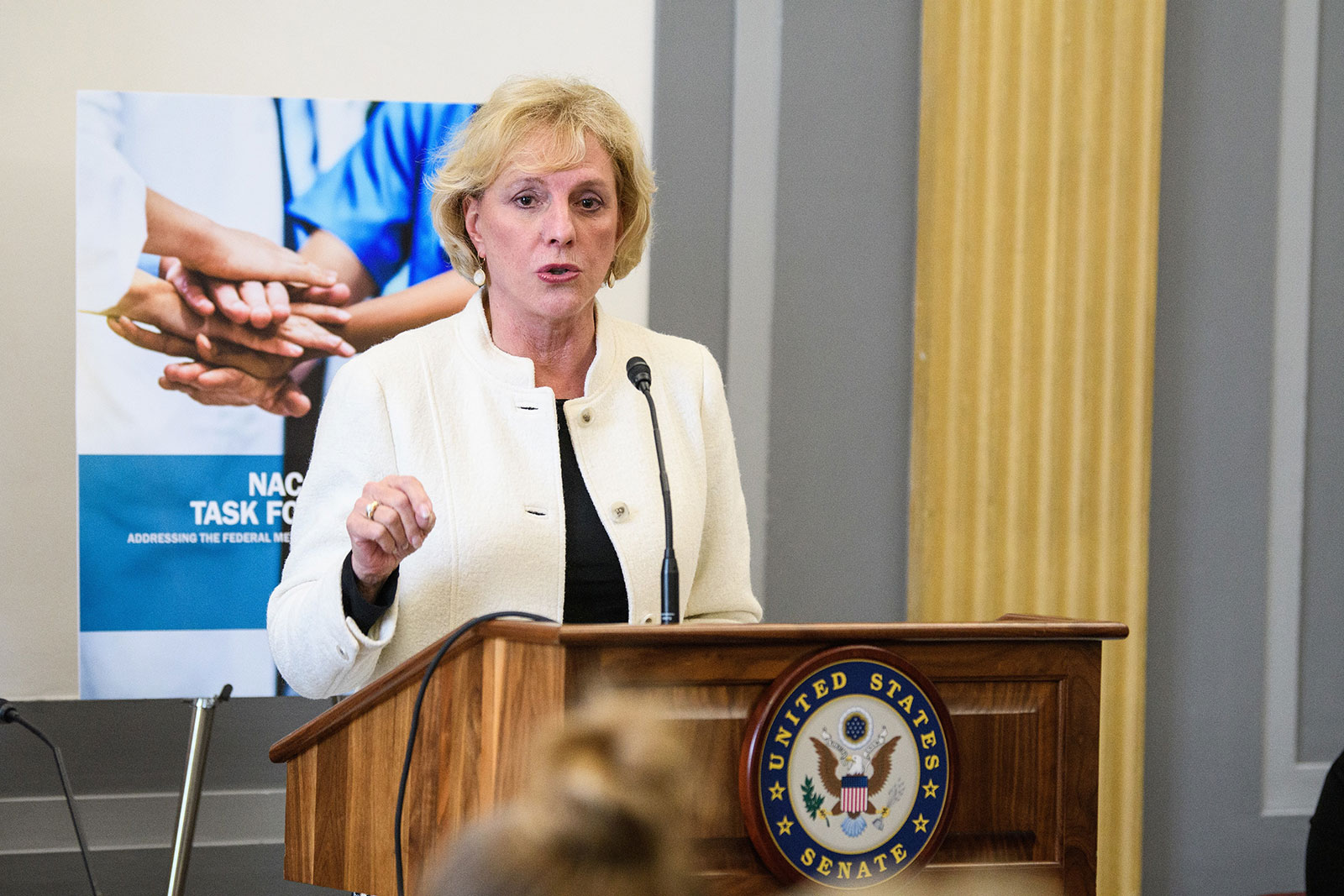 |
Co-chair Commissioner Nancy Sharpe from Arapahoe County, Colo. speaks during a Capitol Hill briefing titled The Intersection of Health and Justice: A Look Inside County Jails during the 2020 Legislative Conference.
Promote Mental Health and Substance Use Treatment and Address Essential Criminal Justice Reforms
NACo supports measures that promote and advance the overall safety of the public, and enhances federal, state and local partnerships to provide evidence-based treatment services to justice involved individuals suffering with mental illness and substance use disorders. NACo urges Congress and the administration to advance legislation and regulations that would amend the federal Medicaid Inmate Exclusion Policy (MIEP) and allow pre-trial individuals to have continued access to necessary treatment through federal health benefits such as Medicaid, Medicare, CHIP and VA health benefits. The current policy denies federal benefits to individuals who are pending disposition and still presumed innocent under the Due Process and Equal Protection clauses outlined under the 5th and 14th Amendments of the U.S. Constitution. Furthermore, NACo supports policies and programs that divert non-violent individuals struggling with mental illness and/or substance use disorders from local jails into more appropriate treatment services.
Counties own and support 903 hospitals and operate 1,943 local health departments
County governments operate 2,875 of our nation’s 3,160 local jails, serving as the front door to our criminal justice system
America’s counties annually invest $176 billion in community health systems and justice and public safety services
10.6 million individuals cycle in and out of more than 3,000 local jails each year
At least 20 percent of jail inmates have a serious mental illness
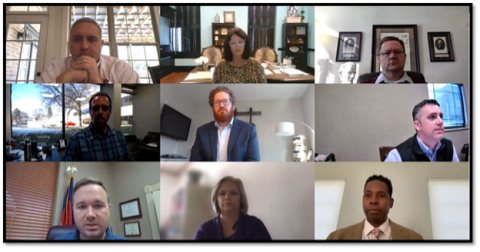
|
In October 2020, NACo formed a Broadband Task Force comprised of nearly three dozen county government officials from across America, to study the lack of reliable broadband with a particular focus on the challenges facing underserved communities.
Boost Advanced Broadband Deployment and Accessibility While Preserving Local Decision-Making
NACo supports a coordinated approach between federal, state and local governments to advance broadband deployment and accessibility while preserving local decision-making. Broadband is imperative to building resilient and future-ready communities in the 21st century. The COVID-19 pandemic has underscored the critical utility of broadband infrastructure. From the homework gap and workforce adaptations, to critical healthcare services and e-commerce – broadband is now the keystone to our nation’s response to the global health pandemic. Counties are committed to bridging the digital divide by deploying accessible and reliable high-speed internet regardless of geographical location.
NACo supports preserving local broadband decision-making to expand internet services for residents. County governments in many states are restricted from making critical investments in local broadband networks due to state-imposed bans and restrictions. These barriers are preventing local governments from effectively and efficiently addressing the challenges of this public health pandemic and looming economic crisis. NACo supports legislation that would remove these state-imposed barriers and empower communities to provide connectivity solutions during this critical time.
In rural areas, just 65 percent of residents have high-speed internet access via both fixed wireless services and mobile LTE broadband
Data collected by NACo shows 77 percent of rural counties are experiencing broadband below Federal Communication Commission (FCC) standards
Approximately 14 million rural Americans and 1.2 million Americans living on tribal lands still lack access to broadband that meets the federal definition for minimum standards
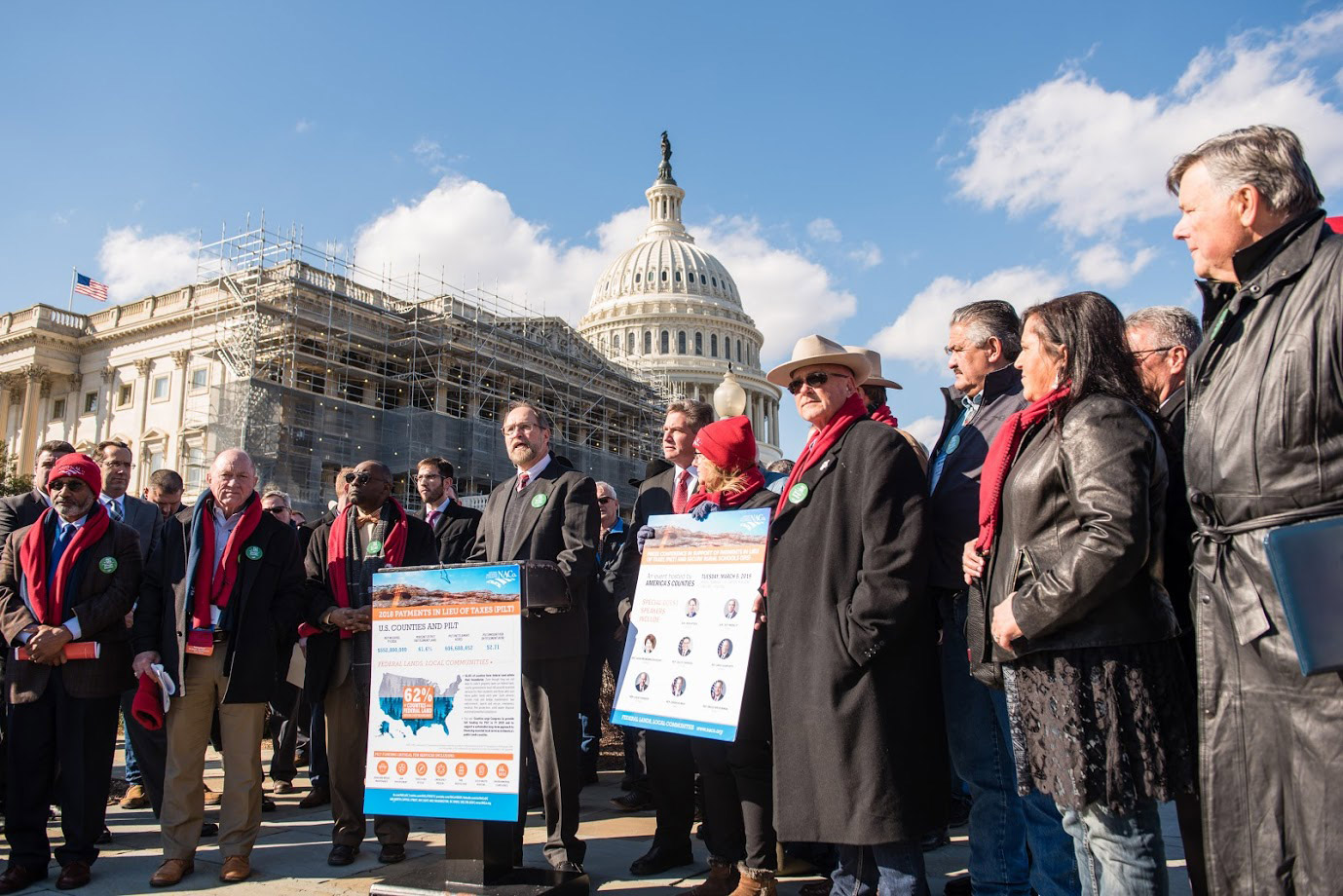 |
NACo’s Western Interstate Region (WIR) President Kevin Cann from Mariposa County, California highlights the importance of the PILT and SRS programs before a press conference during the 2019 Legislative Conference.
Support Full Funding for Payments In Lieu of Taxes (PILT) and the Secure Rural Schools (SRS) Program
NACo supports restoring full mandatory funding for the Payments in Lieu of Taxes (PILT) program, which compensates public lands counties for untaxable federal land. NACo also supports extending the Secure Rural Schools (SRS) program as a transitional funding mechanism until the federal government fully implements a sustainable, long-term forest management program with adequate revenue sharing for forest counties and schools.
NACo supports legislation to ensure mandatory, full funding of PILT, including the reintroduction and passage of the Permanently Authorizing PILT Act and the PILT Reauthorization Act, which would make PILT mandatory for ten years.
NACo also endorses legislation to extend SRS for an additional two years as well as the reintroduction of the Forest Management for Rural Stability Act, which would create an endowment fund to make permanent SRS payments to national forest counties and schools while also granting more flexibility to counties in the use of SRS funds.
Sixty-one percent of counties have federal land within their boundaries, and unlike other local property owners, the federal government does not pay traditional property taxes
PILT and SRS support critical county services, including emergency services, search and rescue, fire protection, forest maintenance, education and transportation infrastructure near and on federal lands
NACo Regulatory Outlook for the Biden Administration |
NACo Regulatory Outlook for the Biden Administration
Promote County Priorities in Future U.S. Environmental Protection Agency (EPA) and Other Federal Rulemaking
Counties support federal policies that balance environmental, public health, safety and local economic needs. As both regulators and regulated entities, counties are responsible for protecting local air, water and land resources through delegated authority under state and federal laws. Federal regulations and guidelines are more effective if they are clear, understandable and can be easily administered at the local level.
As the EPA moves forward with future rulemakings, NACo supports further federal investments and consistent and meaningful engagement with local government officials. Counties support the administration and Congress increasing funding to existing programs to support the successful implementation of future rulemakings. Counties urge the EPA to continue to hold meaningful consultation early in the rulemaking process to reduce the risk of unfunded mandates caused by implementing federal policy.
Counties are major owners, users and regulators of water resources and systems with the responsibility for funding 95 percent of all local public water infrastructure needs
Under the Clean Air Act, states and counties serve as co-regulators with the federal government and are ultimately responsible for implementing new and existing air quality standards
|
|
Cumberland County, Pa. election workers canvass 2020 General Election mail-in and absentee ballots.
Strengthen Election Integrity and Safety
NACo supports federal policies that provide flexibility for local decision making and increased federal investments in the nation’s elections system. Counties play an essential role in the nation's election system, administering elections based on federal and state policies. As administrators and financers of our elections, counties work to ensure our elections are fair, safe and secure. Therefore, NACo supports a consistent, predictable and dedicated federal funding stream to assist counties with meeting the significant federal requirements imposed on local governments administering elections. We also support efforts by Congress and the administration to combat cybersecurity threats in a way that is inclusive of county election and technology officials.
More than 191 million people were registered to vote in the 2020 general election within jurisdictions where counties play a major role in administering and coordinating elections
Between the 2016 and 2018 general elections, county jurisdictions processed over 73 million registration forms
In 2018, counties oversaw more than 151,000 polling places and organized over 593,000 poll workers
2018 TOTAL NUMBER OF DISASTER DECLARATIONS - NATURAL DISASTERS
https://ce.naco.org/?dset=Disaster%20Declarations&ind=Number%20of%20Disaster%20Declarations
Enhance Community Resilience Through Regional and Local Disaster Preparedness
NACo urges Congress and the administration to provide increased federal resources to counties for disaster planning, mitigation and recovery. Counties often serve as our nation’s first line of defense before and after disasters strike. While state statutes and organizational structures vary, local emergency management responsibilities are commonly vested in county governments. NACo supports increased federal investment in support of local emergency management capabilities that improve public safety and environmental stewardship, along with social and economic security.
Furthermore, NACo supports rapid federal reimbursement of local costs associated with major disasters and encourages the U.S. Department of Homeland Security (DHS) to administer policies and regulations on a consistent manner during any presidentially declared disaster or emergency throughout the country. Counties also encourage DHS to apply any policy or regulation changes on a prospective basis, based on the declaration date of the emergency or disaster. NACo supports DHS and FEMA leadership as they work to reduce excessive paperwork as well as overly restrictive and bureaucratic regulations.
On average, over 800 counties per year experience a presidentially declared disaster
In 2020, hurricanes, wildfires and other disasters across the United States caused an estimated $95 billion in damage.
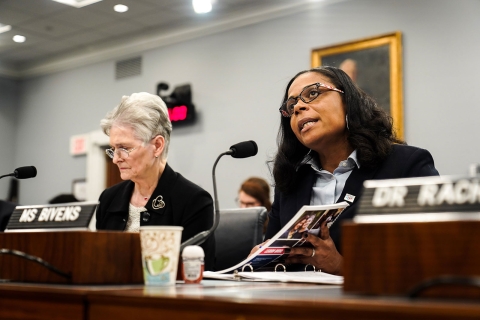
|
Franklin County, Ohio Director of the Department of Job and Family Services Joy Bivens discussed the work that counties are undertaking to break the cycle of poverty during a U.S. House Committee on Ways and Means Subcommittee on Worker and Family Supports hearing.
Promote Workforce Opportunities and Supportive Services for County Residents in Changing Economies
NACo supports federal investments and policies that help advance and leverage both regional and local strategies to engage children, youth, adults and older adults in the development of a competitive and quality workforce.
Due to the economic fallout caused by the COVID-19 pandemic, many counties face challenges in linking residents to sustainable employment opportunities that foster economic mobility. For example, counties are confronting increased demand and caseloads for services that help residents overcome barriers to employment, such as skills training, mental health and substance abuse disorders, accessible childcare and housing affordability. At the same time, county governments face reduced federal and state funding, along with growing federal and state mandates, limitations and oversight.
NACo encourages a strong federal partner committed to providing sustainable and predictable resources, enhancing program efficiency and maintaining local decision-making and flexibility to achieve better outcomes for county residents, especially those in transitioning local economies.
Two-thirds of counties have poverty rates exceeding the national average
Counties employ 3.6 million residents and provide services to 314 million county residents
Government Affairs Staff Directory
- About NACo,
- Intergovernmental Affairs,
- Agriculture,
- Community & Economic Development,
- Environment, Energy & Land Use,
- Health,
- Human Services,
- Justice & Public Safety,
- Education & Workforce Development,
- Public Lands,
- Rural Counties,
- Urban Counties,
- Tax & Finance,
- Telecommunications & Technology,
- Transportation & Infrastructure

